Taking pictures of birds in distant trees can now be done using cameras that have got telephoto lenses. The affordable ones are the bridge cameras. I used to have Nikon Coolpix P500, Nikon Coolpix P600, and.Fujifilm HS50EXR. New products have been released by camera manufacturers.
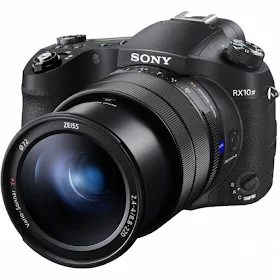 |
| Birding Camera Sony RX10 IV |
- Bridge Cameas: Nikon Coolpix P1000, Nikon Coolpix P900, Sony DSC H400, Canon SX70HS, Canon SX540 HS are relatively new products. Most of them use 1/2.3 inch sensor. Older cameras such as Sony Cybershot HX-350, Sony DSC-H400 are also good for birders who only want to use the camera for taking pictures of birds and share them in social media or for identification purposes. I personally used several versions of Nikon and Sony. They were good for shooting birds that were sitting still on twigs in good light condition. For lowlight ones or for birds in flight, these bridge cameras would face difficulties trying to focus on their subjects. I usually lower the exposure a little to take pictures of birds in low light condition. The result can be seen at the sample picture of Magnificent Bird of Paradise below. I did not use tripod. If I edit the photograph in Adobe Photoshop to brighten it, I will get good picture. I like carrying bridge camera with me while I guide tourists in the forest of Raja Ampat, Sorong regency, Tambrauw Mountains and Arfak mountains because it is small, light, and can easily fit into my small backpack.
- Brige Cameras with bigger sensors: Fujifilm HS50EXR, Panasonic Lumix FZ2500 and Sony Cybershot RX10 IV. I used to use Fujifilm HS50EXR for several years. Its zoom lenses were 42 times, equivalent to 1,000 mm lenses in 35 mm format. Fujifilm does not continue the development of the camera. It was a good product but not the best one. Perhaps, the Sony Cybershot RX10 IV is a good choice for those who have money. It has got 1 inch sensor and zoom lenses that are equivalent with 600 mm telephoto lenses in 35 mm format.
- I used to try digiscoping system. It was not easy. Best results could be obtained if the scope and the camera or cell phone can be perfectly aligned using an adapter. If the scope can generate clear and sharp image, the result will be good photos. Shooting birds in flight is almost impossible.
- D-SLR cameras with telephoto lens. Professional photographers invest a lot of money on buying expensive camera such as Nikon D5, Nikon D500, Canon EOS 7D, Canon 1DX Mark II. For telephoto lens, Sigma 150-600mm sport or Tamron 150-600mm G2 is a good choice. As a birding guide, I only use photographs for promoting birding tours and guiding service, I use Canon 200D with Tamron 150-600mm G2 as my photographic device.
Sample of Photographs:
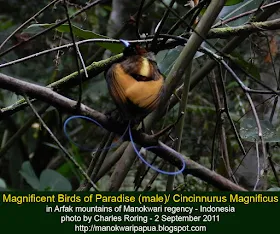 |
| Magnificent Bird of Paradise shot using Nikon Coolpix P500 |
 |
| Picture of Coconut Lorikeet in a tree in Raja Ampat which I shot using Fujifilm HS50EXR |
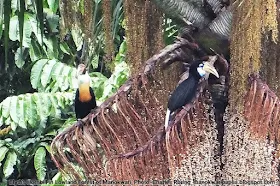 |
| Picture of Blyth's Hornbill in a distant palm tree which I shot using Fujifilm HS50EXR |
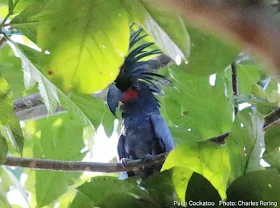 |
| Picture of Palm Cockatoo locally called Kakaktua Raja, that I shot using Canon 200D with Tamron 150-600 mm G2 |
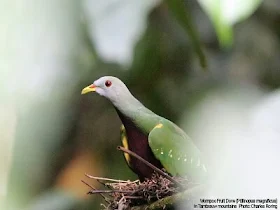
For me, a birdwatching guide who also maintain some blogs related to my job, having a camera is a must. However, I use the pictures that I take only for my blog posts and facebooks. I do not think I need a professional D-SLR camera. An entry level D-SLR camera with telephoto lens or a bridge camera with super telephoto lens is my favorite tool. Professional wildlife photographer usually invest in high quality photographic devices such as Canon EOS 1D X Mark II, Nikon D500.
For lenses: Nikon AF-S FX NIKKOR 200-500mm f/5.6E ED Vibration Reduction Zoom Lens with Auto Focus and Canon EF 100-400mm f/4.5-5.6L IS Telephoto Zoom Lens are good choice. Sigma 150-600mm sport and Tamron 150-600mm G2 are also recommended. They are more affordable but have got higher reach.
Birds are not the only subjects that I shoot when I accompany tourists in the forest. I also take pictures of flowers, insects, mammals, scenery and people. That's why in the blog readers can see other photographs as well such as Red Hibiscus and White Passion Flowers, orchids, Blue Trumpet Vine, or landscape of Anggi lakes, or even marine life (for this purpose, I use underwater camera such as Nikon Coolpix AW130.
Also read:
Birds are not the only subjects that I shoot when I accompany tourists in the forest. I also take pictures of flowers, insects, mammals, scenery and people. That's why in the blog readers can see other photographs as well such as Red Hibiscus and White Passion Flowers, orchids, Blue Trumpet Vine, or landscape of Anggi lakes, or even marine life (for this purpose, I use underwater camera such as Nikon Coolpix AW130.
Also read:
No comments:
Post a Comment